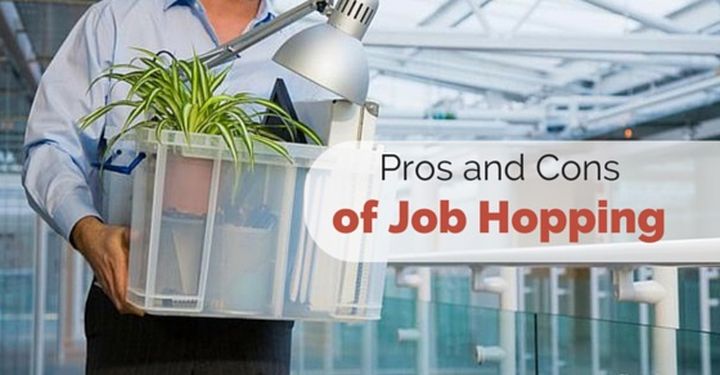6 Pros and Cons of a Job-Hopping

The modern job market has the highest number of job opportunities ever created in human history. No wonder modern job seekers hop from one job to another. Whether it’s a professional unfulfillment or an unsatisfying salary, changing a job might be a good idea, especially if you’ve been planning to change industries for years. Before opting for a different occupation, check both pros and cons of job-hopping in the article below.
What is Job-Hopping?

You’re a job-hopper if you change your job position too frequently. Traditionally, recruiters will call an applicant a job-hopper if they change their work every two years. Sure, you may impress a hiring manager by reaching out to Skillhub specialists and composing a bot-beating resume. However, questions on why you’ve changed your jobs so often will arise.
What are the most popular reasons for job-hopping?
• Low salary. If you’re stuck with the same number of dollar signs and the employer refuses to raise your pay, try job-hopping;
• The lack of career opportunities. If you feel that you’ve been using the same key skills for years, job-hopping might be a quick solution. You don’t want the ‘broken’ career ladder to hinder your talents, right?
• Moving to a different city. A simple reason that any recruiter will understand;
• Life changes. Obviously, having a baby will require more time and flexibility in one’s schedule.
1. It’s Time to Climb the Career Ladder

Did you find yourself waiting for a promotion for years? Time to leave the old job and invest in your career! If you have skills but don’t use them, you’ll lose them one day. For instance, you’re a graphic designer who got stuck with creating booklets for years. What about your dream job? Any career advice expert will tell you that if you spent three years without a promotion, leave it.
How will job-hopping help you springboard your career?
• You’ll finally use your professional skills to the fullest;
• You’ll have more interesting job responsibilities;
• By changing jobs frequently, you’ll learn the work aspects you like and the ones you hate.
2. More Dollar Signs
If that clink-and-clunking sound left your pocket, time to job-hop. Waiting for a raise might take years in some companies. Sure, you’ll get incredible work experience, but the holes in your pocket won’t pay your bills. Before you consider job-hopping, ask the hiring manager for a raise during the performance evaluation period. If that doesn’t happen, apply for a different job while asking for a higher salary in your resume. The recruiters suggest you ask for a 10% higher salary than the one you’re ready to accept. This will set your bar higher in bargaining about your salary with recruiters.
3. Getting Bored is No Longer an Option
Let’s stay honest; work makes everyone exhausted from time to time. If you find yourself scrolling down the job posts for hours, take a break. Go for a vacation. If that doesn’t help, land your two weeks notice on the recruiter’s desk. After that, write down the features you’d like to see in your new job. Is it adaptability? Or friendly colleagues? Start searching!
• Job-hopping will help you understand a variety of corporate cultures;
• You’ll learn to prioritize things. For instance, next time you leave the company with a rigid schedule, you’ll search for a flexible one.
4. Stress and Anxiety

Sometimes, finding a new job will take much more time than expected. Changing jobs will be too stressful if there is no one to pay for your rent and a long-forgotten student loan. Switching jobs too often might cause anxiety as adapting to new work conditions takes time and effort. In the end, you might get more stressed out from job-hopping than the actual burnout at your old workplace.
How to avoid getting stressed from job-hopping?
• Stick to your values. If you hate office surroundings, land an interview for an online job;
• Improve your saving strategies. Make sure your savings cover your monthly expenses while you’re searching for a job.
5. Low Trust from Recruiters
Your job-hopping history might cause tons of questions from the recruiting firms. A traditional recruiter will think of you as an unreliable employee unless you give them your reasons. We advise you to write a cover letter with the help of top resume services to persuade a recruiter that you’re a responsible applicant. Here, your cover letter will be a rescuing boat in your dream job journey.
6. Job Dissatisfaction

You can never be 100% sure that you’ll like your new job. In fact, your next company might treat you worse than the previous one. It’s not enough to craft a winning resume and hope that the next workplace will be perfect. Be prepared for disasters like stressful deadlines and unfriendly coworkers. However, the beauty of job-hopping is that once you discover you hate the job, you can always skip it!
Reasons for job dissatisfaction as a result of job-hopping:
• Lower pay than expected;
• Toxic working environments;
• The lack of flexibility;
• Lower trust from employers;
• Work overload.
Final Thoughts

Job-hopping is not a new concept in the modern job culture. People consider job-hopping when searching for job perks like high salary and flexibility. Regardless of your reasons for job-hopping, make sure you stay in the budgeting framework. Oh, and don’t forget to write that cover letter!
We hope the article was helpful to you. Good luck!
